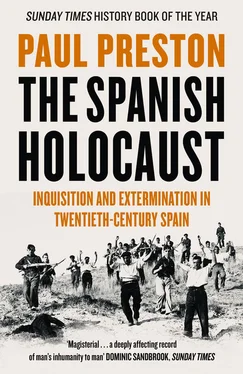Inevitably, within the Socialist Youth and among the younger, unskilled union members there was a great surge of enthusiasm for revolution. Largo Caballero was happy to go along with their demands lest they drift towards the more determinedly revolutionary CNT. Although, at a joint meeting of the union (UGT) and party (PSOE) executives on 25 November, revolutionary proposals were defeated, the moderate Indalecio Prieto reluctantly agreed on the need for ‘defensive action’. The two executives compromised with a declaration urging workers to be ready to rise up and oppose ‘reactionary elements in the event that they went beyond the bounds of the Constitution in their public determination to annul the work of the Republic’. A joint PSOE–UGT committee was set up to prepare this ‘defensive action’. 13The lack of Socialist participation in the CNT insurrection two weeks later showed that reformist habits prevailed over the new revolutionary rhetoric. The CEDA’s support for the assault on unionized labour together with its declared determination to smash socialism and to establish a corporativist state made it, for most Spanish leftists, indistinguishable from the Italian Fascist Party or the early Nazi Party. The Socialist leadership wanted to avoid the errors made by their German and Italian comrades, but they had no real intention of actually organizing a revolution. Instead, they hoped that threats of revolution would calm rank-and-file frustration and restrain right-wing aggression.
No Socialist organizations had participated in the CNT action, although a few individual militants had done so, believing it to be the ‘defensive action’ agreed on 26 November. 14In the Cortes, Prieto condemned ‘this damaging movement’. Yet, when both Gil Robles and the monarchist leader Antonio Goicoechea enthusiastically offered to help the government crush subversion, Prieto reacted angrily. It disturbed him that the ‘enemies of the Republic’ supported the regime only when the proposal was for the repression of the working class. By their determination to silence the workers’ organizations, Prieto perceptively told the deputies of the right, ‘you are closing all exits to us and inviting us to a bloody conflict’. 15
On 16 December, Lerroux formed a government with the parliamentary support of the CEDA. Three days later, Gil Robles made a policy statement in the Cortes which explained that, in return for CEDA votes, he expected an amnesty for those imprisoned for Sanjurjo’s coup of August 1932 and a thorough revision of the religious legislation of the Constituent Cortes (so called because it was the parliament that elaborated and approved the Republican Constitution). Most alarming for the left were his demands for the repeal of the reforms which had most benefited the landless peasantry – the laws of municipal boundaries and of obligatory cultivation, and the introduction of the eight-hour day and of mixed juries (arbitration committees). He also demanded a reduction of the area of land subject to expropriation under the agrarian reform bill and denounced the socializing concept of settling peasants on the land. Most alarming for the left was his statement that his ambition was to lead a government and change the Constitution: ‘We are in no hurry, we want other proposals to fail so that experience will show the Spanish people that there can only be one solution, an unequivocally right-wing solution.’ Behind the measured tone, there lay a dramatic threat that, if events showed that a right-wing evolution was not possible, the Republic would pay the consequences. Not surprisingly, the Socialists regarded this as a fascist speech. 16In reply, Indalecio Prieto made it clear that, for the Socialists, the legislation that Gil Robles aimed to repeal was what made the Republic worth defending. He threatened that the Socialists would defend the Republic against Gil Robles’s dictatorial ambitions by unleashing the revolution. 17In the exchange could be seen the seeds of the violent events of October 1934.
The appalling dilemma faced by the PSOE executive was revealed by Fernando de los Ríos when he visited the ex-Prime Minister Manuel Azaña on 2 January 1934. Azaña noted in his diary:
He recounted to me the incredible and cruel persecutions that the workers’ political and union organizations were suffering at the hands of the authorities and the employers. The Civil Guard was daring to do things it had never dared do before. It was impossible to restrain the exasperation of the masses. The Socialist leaders were being overwhelmed. Where would it all end? In a great misfortune, probably. I was aware of the barbaric policy followed by the government and of the way the landowners were reducing the rural labourers to hunger and of the retaliations and reprisals against other workers. I know the slogan ‘Let the Republic feed you’ [Comed República]. But all of this and much more that De los Ríos told me, and the government’s measures, and the policy of the Radical–CEDA majority in the Cortes, which aimed only to undo the work of the Constituent Cortes, did not make it advisable, nor justifiable, for the Socialist Party and the UGT to launch themselves into a movement of force.
Azaña told De los Ríos categorically that it was the duty of the Socialist leadership, even at the risk of their own popularity, to make their followers see that an insurrection would be madness. His reason was that ‘there was no reason to expect the right to react calmly or even to limit their reaction to the re-establishment of law and order. In fact, they would abuse their victory and would go far beyond what was happening already and what they were announcing.’ Shortly afterwards, De los Ríos reported Azaña’s prophetic words to the PSOE executive committee. However, given the employers’ intransigence, it was impossible for them to tell their rank and file to be patient. 18
PSOE offices received reports from all over Andalusia and Extremadura about provocations from owners and Civil Guards alike. The new government appointed several conservative provincial governors in the south, a move which was soon reflected in the law being flouted with impunity and an increase in the ‘preventive brutality’ of the Civil Guard. In El Real de la Jara, in the sierra to the north of the province of Seville, the local landowners had refused to employ union labour. A subsequent strike lasted several months and, in December 1933, some starving workers found with acorns stolen from pig troughs were savagely beaten by the Civil Guard. The Civil Governor suspended the village Mayor when he protested to the local Civil Guard commander about these abuses. In Venta de Baúl (Granada) the armed guards of the cacique, a member of the CEDA, beat up local union leaders. 19
In Fuente del Maestre, Fuente de Cantos, Carmonita and Alconchel (Badajoz), it was the Civil Guard which did the beating when hungry workers were caught collecting windfall olives and acorns. Elsewhere in Badajoz, to prevent labourers being able to alleviate their hunger in this way, the owners took pigs into the fields to eat the fallen crops. Some yunteros (ploughmen) who had started to plough an abandoned estate were imprisoned and the Civil Guard occupied the Casa del Pueblo in nearby Hornachos. In contrast, nothing had been done about the deaths in the same town nine months earlier. In many pueblos, especially in Badajoz, Jaén and Córdoba, landowners ignored regulations about rotating jobs among those registered at the local labour exchange. They would give work only to those who had voted for the right and systematically refused jobs to members of the FNTT. In Almendralejo, during the grape and olive harvests, despite massive local unemployment, two thousand outside labourers were brought in. In Orellana la Vieja and Olivenza, the owners employed only women and children, who were paid a fraction of the wage normally paid to men. 20
Читать дальше












